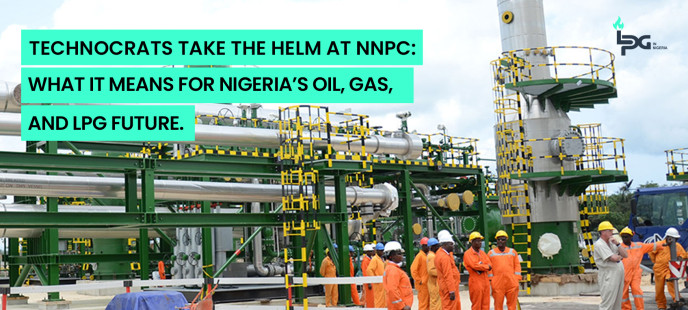- 3110
- 0
Sharing Ideas and Updates on LPG in Nigeria and related information to enable effective collaboration within the LPG Value Chain
Technocrats Take The Helm At NNPC: What It Means For Nigeria’s Oil, Gas, And LPG Future

In a decisive move to steer Nigeria’s oil and gas sector toward greater efficiency, transparency, and innovation, President Bola Ahmed Tinubu has announced a sweeping reconstitution of the Nigerian National Petroleum Company (NNPC) Limited's board. This landmark reshuffle, made public on April 2, 2025, reflects a shift from political appointments to a technocratic leadership model, one that prioritizes expertise, experience, and strategic thinking over patronage. With this bold step, Nigeria signals its readiness to compete on the global energy stage.
At the core of this transformation is the appointment of Bashir Bayo Ojulari as the new Group Chief Executive Officer, replacing Mele Kyari, and Ahmadu Musa Kida as non-executive chairman, succeeding Pius Akinyelure. Both Ojulari and Kida bring decades of field-tested industry experience to the table—Ojulari with a pedigree in petroleum engineering and leadership roles across Shell operations worldwide, and Kida with a blend of engineering and management expertise honed over a successful career in Total and Elf Petroleum.
The Board's New Face
The newly constituted 11-man board includes professionals drawn from various segments of the energy value chain. Individuals like Adedapo Segun, a seasoned finance and operations executive, and Babs Omotowa, former NLNG boss, bring proven success in raising capital and optimizing operations. Others like Austin Avuru, David Ige, and Henry Obih bring the invaluable advantage of having led key upstream, midstream, and downstream projects. With Lydia Shehu Jafiya representing the Ministry of Finance, fiscal accountability is also assured.
What unites them all is not just experience, but a track record of results. This new team is expected to deliver on President Tinubu’s vision of boosting Nigeria’s crude refining capacity—targeting 200,000 barrels per day by 2027 and ramping up to 500,000 barrels by 2030. More importantly, this change hints at broader reforms that will touch every segment of Nigeria’s hydrocarbon sector—including Liquefied Petroleum Gas (LPG), a crucial but often overlooked component of Nigeria’s energy mix.
Implications for Nigeria’s LPG Sector
The appointment of technocrats to the NNPC board is especially significant for the LPG industry. As Nigeria continues to grapple with energy poverty and seeks cleaner, more affordable alternatives to firewood and kerosene, LPG stands out as a viable solution. However, the sector has long suffered from underinvestment, infrastructure bottlenecks, and inconsistent policy implementation.
With the likes of David Ige—who spearheaded the Nigeria Gas Master Plan—and Austin Avuru, known for pioneering local content and gas commercialization, now part of the board, the prospects for LPG development have dramatically improved. This is a leadership team that understands the need for a coherent gas strategy, and more importantly, knows how to deliver it.
We can anticipate a push toward expanding Nigeria’s domestic LPG production capacity, improving distribution logistics, and deepening market penetration—particularly in rural and underserved areas. More investment could also flow into storage and bottling plants, helping to reduce the price volatility that has plagued the sector. The renewed focus on gas-to-power initiatives and industrial uses of LPG will also create a multiplier effect on job creation and energy access.
Furthermore, with Jafiya from the Ministry of Finance on the board, there’s likely to be a more structured financial framework for attracting both local and foreign investors into the LPG space. Tax incentives, subsidies for rural LPG adoption, and improved importation regimes could be part of future policy initiatives guided by this more strategic board.
A New Chapter in Energy Governance
This board overhaul marks a turning point for NNPC and Nigeria’s broader energy ecosystem. By placing technocrats in key leadership positions, the Tinubu administration is betting on competence over connections. The expectation is clear: improved refining capacity, greater transparency, better investment outcomes, and an accelerated transition to gas-powered solutions—especially LPG.
For an industry that has long cried out for reform, this is a promising start. If this momentum is maintained, Nigeria could finally unlock the full potential of its hydrocarbon resources and make LPG a central part of its energy future—cleaner, cheaper, and more accessible for all.
















0 Comment.